Islamabad :
The government has begun negotiations with the IMF to release significant funds, a process that has been slow due to fears of a lack of economic reform in the country.
The finance ministry said in a tweet that talks were under way in Doha, the capital of Qatar, and could continue until next week.
Pakistan has sought support from international organizations for the economy, which has been hit hard by rising national debt, rising inflation and devaluation of the rupee.
The talks were attended by Finance Minister Muftah Ismail, Minister of State Dr Ayesha Ghous Pasha, Finance Secretary Hameed Yaqub Sheikh, caretaker Governor of State Bank of Pakistan (SBP) Dr Murtaza Syed and other officials of Finance Division.
The main point of the talks is heavy subsidies on petroleum products and electricity, while Muftah Ismail says he wants a middle ground between the two sides.
Economist Shah Rukh Wani said the government would try to persuade the IMF that some subsidies must be continued to achieve political stability.
He said the IMF would probably and correctly say that it was unsustainable and that subsidies should be scrapped to control trade and budget deficits.
Former Prime Minister Imran Khan signed a 6 6 billion bailout package with the IMF in 2019, which was never fully implemented, as his government did not abolish subsidies in violation of the agreement. It also increased revenue and tax revenue.
Islamabad has so far received 3 3 billion under this program, which is scheduled to be completed by the end of the year.
Officials want the program to be extended to June 2023, with a ارب 1 billion installment.
Prime Minister Shahbaz Sharif is committed to improving the sinking economy, but experts say his weak government has failed to make tough decisions.
The IMF, in recent talks with the finance minister, has made the continuation of the loan program conditional on the abolition of fuel subsidies, which were introduced by the previous government.
However, Prime Minister Shahbaz Sharif had rejected several summaries of the Oil and Gas Regulatory Authority (OGRA) and the Ministry of Finance on the rise in prices of petroleum products.
Michael Colgman, deputy director of the Wilson Center in Washington for South Asia, said the administration has refused to make tough political decisions to revive the economy, but that it would have to make “sacrifices” to join the IMF.









